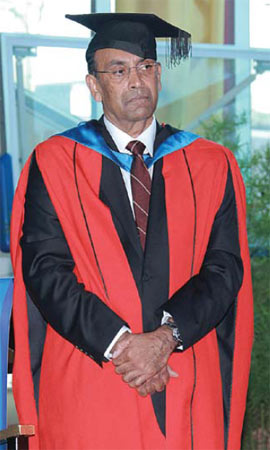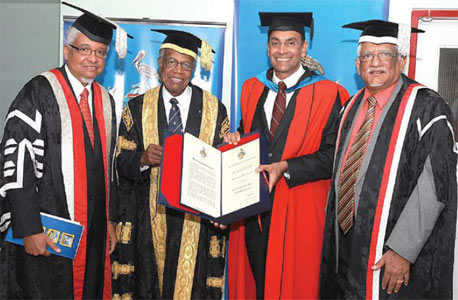 |
 |
 |
|
November 2011
|
HONORARY GRADUATE Let virtue guide youProfessor Anantanand Rambachan
The central purpose of this Ceremony, however, is to celebrate the achievements of our graduates from the Faculties of Science and Agriculture. I rejoice with your teachers, your families and your friends in your scholarly success and join them in congratulating you. I am proud to belong to, and to welcome each one of you into, the community of graduates of The University of the West Indies. This is a community that has achieved excellence and distinction in all of the fields of human endeavour. You will now enrich this community with your own special talents as you devote yourselves to your careers. Along with our membership in this community, I share with you also a profound sense of gratitude. Human success is never solitary and individual. Human potential is realized only in a community of human beings. The list of those to whom we are indebted for our achievements is truly unfathomable. With you today are those who dreamt of and imagined this day soon after you were born, planned a way to your graduation and worked daily to make it a reality. Their hearts were united with your own, delighting in your success and supporting you through disappointments and failures. They were anxious about your safety and your health and woke up each day with a hope and wish for your wellbeing. Such love is not ordinary. Our celebration of success must always be infused with the grace of gratitude and the gentleness of humility. Those whose generosity with their love and resources make our flourishing possible must always be in our hearts. The journey of life is always more delightful for those who travel with gratitude and humility. You are the recipients of one of the finest educational experiences in the world. In your disciplines of Science and Agriculture you have received a body of knowledge acquired through the diligent labours of distinguished researchers. You are trained also in the empirical methods of inquiry that are appropriate to discovering new knowledge in your fields and I hope that some of you will enrich your field with your own discoveries. Your academic discipline however, does not specify the core ethical commitments that determine the use to which its knowledge and methods are employed. This is a critical choice that you must make. It is one that goes to the very heart of the person you understand yourself to be. I urge you to be thoughtful and intentional about your choices. You will most certainly, use your education to find and perform work that enables you to satisfy decently the legitimate needs that every human being ought to have opportunities to secure. I know that these are difficult times to find good work and wish you well in this search. But will the fulfilment of personal needs and desires be the only concern in the use of your learning? And even so, what are the core ethical values and commitments that will guide your choices and decisions in your work?
May the use to which you put your learning and training be guided always by virtue. When in doubt, return to gratitude, and remember those who considered your wellbeing and gave of themselves with extraordinary generosity for your flourishing. If you do so, you will make this institution, your teachers, your families, your countries and yourselves proud. May your lives be filled always with the happiness that I see on your faces today. Thank you for the honour of addressing you and thank you for the honour you have so generously bestowed on me. |

 It is a distinct honour to receive today the Honorary Degree of Doctor of Laws from The University of the West Indies. The award of this degree is made even more special by the fact that it is conferred by my Alma Mater. I want to express my deepest gratitude to The University of the West Indies for this special recognition. I receive it also as a recognition of my discipline, one of the most ancient of scholarly disciplines.
It is a distinct honour to receive today the Honorary Degree of Doctor of Laws from The University of the West Indies. The award of this degree is made even more special by the fact that it is conferred by my Alma Mater. I want to express my deepest gratitude to The University of the West Indies for this special recognition. I receive it also as a recognition of my discipline, one of the most ancient of scholarly disciplines.  I ask you to ponder these questions for a most troubling reason. Here in Trinidad and Tobago, in the United States and in other parts of our world, choices were made in places of work that brought economies to the brink of collapse and devastated the lives of thousands of families. The effects may endure for generations. The persons making these decisions were educated at the finest universities and business schools. They were among the brightest of their generation, leaders in their fields. In their decision-making, most tragically, they were motivated by a concern only for private goals and were indifferent to what we speak of today as the public good. Their learning did not find expression in an ethical way of being, where compassionate concern for the wellbeing of others is a central purpose. I hope that a commitment to the public good will inform deeply the use to which you put your fine education and that your decisions will always be informed by a thoughtful regard for the good. This is the kind of graduate-leader that Trinidad and Tobago and countries across the world need. Knowledge without virtue is dangerous to the public good and does not create caring communities where human beings work together to overcome suffering and promote a culture where life flourishes.
I ask you to ponder these questions for a most troubling reason. Here in Trinidad and Tobago, in the United States and in other parts of our world, choices were made in places of work that brought economies to the brink of collapse and devastated the lives of thousands of families. The effects may endure for generations. The persons making these decisions were educated at the finest universities and business schools. They were among the brightest of their generation, leaders in their fields. In their decision-making, most tragically, they were motivated by a concern only for private goals and were indifferent to what we speak of today as the public good. Their learning did not find expression in an ethical way of being, where compassionate concern for the wellbeing of others is a central purpose. I hope that a commitment to the public good will inform deeply the use to which you put your fine education and that your decisions will always be informed by a thoughtful regard for the good. This is the kind of graduate-leader that Trinidad and Tobago and countries across the world need. Knowledge without virtue is dangerous to the public good and does not create caring communities where human beings work together to overcome suffering and promote a culture where life flourishes.